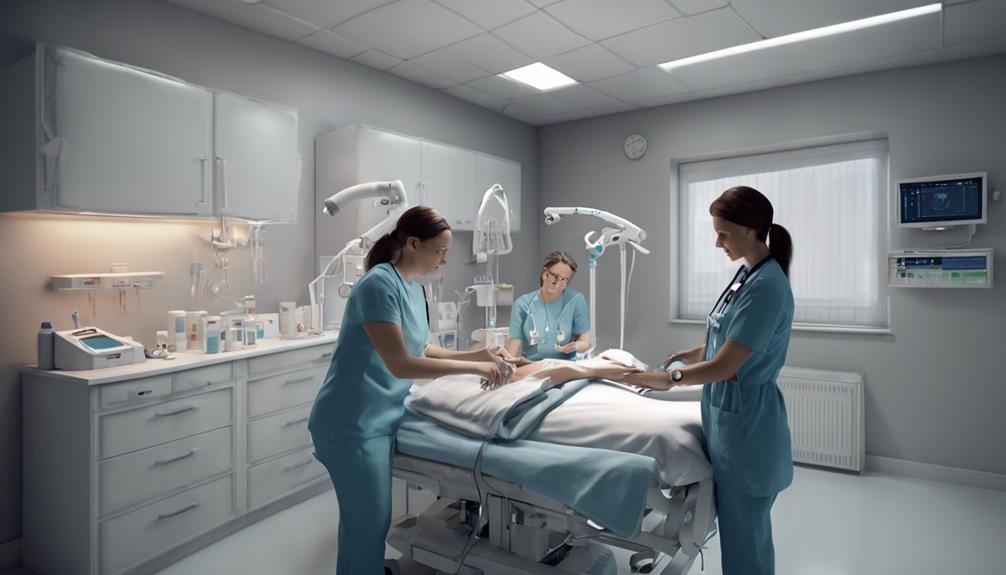Licensed Practical Nurse Job Description
Licensed Practical Nurses (LPNs) provide direct patient care, assist in clinical procedures, and maintain health records for positive health outcomes. They administer medications, support treatment plans, and collaborate closely with healthcare teams. LPNs play an essential role in healthcare settings with job stability and room for career advancement. Their educational requirements include state-approved programs and passing the NCLEX-PN exam. LPNs engage in patient care responsibilities, clinical procedure assistance, and health record maintenance. Their attention to detail and collaboration skills contribute to improved patient outcomes and career growth opportunities. Learn more about LPN responsibilities, skills, and career outlook for a thorough understanding.
Key Takeaways
- LPNs assist with clinical procedures and ensure precise health record maintenance.
- They provide direct patient care, engage in patient interaction, and coordinate care duties.
- LPNs administer medications, handle injections, and support treatment plan implementation.
- Collaboration with the healthcare team is essential for thorough patient care and positive outcomes.
- Continuing education opportunities enhance LPNs' knowledge, skills, and career advancement prospects.
Educational Requirements
To become a Licensed Practical Nurse (LPN), individuals must complete a state-approved educational program, typically offered by vocational schools or community colleges. Certification requirements for LPNs vary by state but generally involve completing an accredited LPN program and passing the National Council Licensure Examination for Practical Nurses (NCLEX-PN). These programs typically take around 1 year to complete and cover essential topics such as nursing principles, pharmacology, and patient care procedures.
In addition to classroom instruction, educational programs for LPNs often include practical experience opportunities in healthcare settings. These clinical rotations allow students to apply their knowledge in real-world situations under the supervision of experienced nurses. This hands-on experience is crucial for developing the skills and confidence necessary to provide quality patient care upon graduation.
Job Duties
The job duties of a Licensed Practical Nurse encompass a wide range of responsibilities focused on providing thorough patient care.
These duties include:
- Assisting with clinical procedures,
- Ensuring precise health record maintenance, and
- Collaborating with other healthcare professionals to deliver high-quality care.
LPNs play an essential role in supporting patient well-being and promoting positive health outcomes.
Patient Care Responsibilities
As part of their role, Licensed Practical Nurses are responsible for providing direct patient care in various healthcare settings. This includes engaging in direct patient interaction to assess, monitor, and provide for the patients' basic medical and personal needs.
LPNs also play an essential role in care coordination duties, ensuring that patients receive the appropriate treatments and medications as prescribed by healthcare providers. They collaborate with other healthcare professionals to develop and implement patient care plans, as well as communicate with patients and their families about the care being provided.
LPNs are instrumental in maintaining accurate patient records, documenting key signs, and reporting any changes in the patient's condition to the supervising Registered Nurse or physician.
Clinical Procedure Assistance
Licensed Practical Nurses demonstrate their expertise by actively participating in clinical procedures, offering valuable assistance to healthcare providers, and ensuring the smooth execution of medical interventions. They receive hands-on training to develop and refine their nursing skills, enabling them to assist with various clinical procedures such as wound care, medication administration, and diagnostic testing.
LPNs play an essential role in preparing patients for procedures, providing support during the process, and monitoring patients post-procedure. Their attention to detail and ability to follow protocols accurately contribute to the overall success of the clinical procedures. By working closely with the healthcare team, LPNs help maintain a safe and efficient environment for both patients and providers during medical interventions.
Health Record Maintenance
With meticulous attention to detail, licensed practical nurses meticulously maintain accurate and up-to-date health records as part of their job duties. Health record management is a vital aspect of their role, requiring LPNs to record patient information, medical histories, symptoms, treatment plans, and outcomes accurately.
LPNs must guarantee that all entries are up-to-date, organized, and easily accessible for healthcare providers. Additionally, they must adhere to data privacy compliance regulations, such as HIPAA, to protect patient confidentiality and sensitive information.
LPNs play an essential role in maintaining the integrity and security of health records, contributing to efficient patient care and effective communication among healthcare team members. Their commitment to thorough and precise record-keeping is crucial for quality healthcare delivery.
Work Settings
In the field of healthcare, licensed practical nurses can be found working in a variety of diverse and dynamic settings. These settings not only impact the work environment but also play an essential role in their professional development and job satisfaction.
Here are some common work settings for licensed practical nurses:
- Hospitals: LPNs in hospitals work in fast-paced environments, providing direct patient care alongside other healthcare professionals. The setting offers opportunities for professional growth and exposure to a wide range of medical conditions.
- Nursing Homes: Working in nursing homes allows LPNs to build long-term relationships with residents, providing consistent care and support. This setting can offer a sense of fulfillment and job satisfaction through making a difference in the lives of the elderly.
- Community Health Clinics: LPNs in community health clinics often work with underserved populations, contributing to the betterment of society. This setting can provide a unique sense of purpose and opportunities for career advancement.
Skills and Qualifications
To excel in the role of a practical nurse, candidates must possess a diverse set of clinical skills and educational qualifications. Communication skills are paramount as LPNs interact with patients, families, and healthcare teams daily. Effective communication guarantees proper patient care coordination and understanding of treatment plans. Time management is vital in prioritizing tasks, administering medications promptly, and documenting accurately.
Furthermore, LPNs need strong critical thinking abilities to assess patient conditions, identify changes, and collaborate with registered nurses and physicians for best care outcomes. Problem-solving skills are essential in addressing unexpected situations, such as medical emergencies or patient concerns, swiftly and effectively. Educational qualifications typically include completion of a state-approved practical nursing program and passing the NCLEX-PN exam.
LPN Responsibilities
LPNs are entrusted with patient care duties, ensuring the well-being and comfort of individuals under their supervision.
In addition, they carry out medication administration tasks, adhering to dosage instructions and monitoring any adverse reactions.
Moreover, LPNs provide essential support to treatment plans, collaborating with healthcare teams to implement and adjust interventions as needed.
Patient Care Duties
With a focus on providing thorough patient care, a Licensed Practical Nurse (LPN) carries out a range of essential responsibilities within healthcare settings. LPNs perform nursing evaluations to evaluate patients' health status accurately. They are responsible for monitoring important signs regularly to guarantee patients' well-being and detect any changes promptly.
Additionally, LPNs provide compassionate bedside care, addressing patients' comfort needs and assisting with activities of daily living. This holistic approach to patient care not only focuses on physical health but also considers the emotional and mental well-being of individuals under their care.
LPNs play a critical role in fostering a supportive and healing environment for patients, contributing significantly to their overall recovery and well-being.
Medication Administration Tasks
In the domain of healthcare settings, the vital role of a Licensed Practical Nurse (LPN) includes adeptly managing medication administration tasks. LPNs are responsible for ensuring accurate dosage calculation to prevent medication errors and adverse effects from drug interactions. They are trained to administer medications through various routes, including oral, topical, and inhalation.
LPNs also play a key role in injection administration, such as intramuscular or subcutaneous injections, as well as assisting with intravenous (IV) therapy under the supervision of a registered nurse or physician. Attention to detail is paramount in medication administration tasks to guarantee patient safety and well-being. LPNs must follow protocols diligently to deliver medications effectively and support positive patient outcomes.
Treatment Plan Support
Supporting the implementation of treatment plans is a core aspect of the responsibilities undertaken by Licensed Practical Nurses in healthcare settings. This essential role involves care plan coordination and treatment protocol implementation to guarantee ideal patient care and recovery.
LPNs provide clinical support by closely monitoring patients' progress and adjusting treatment plans as necessary. They collaborate with the healthcare team to develop and execute a thorough patient wellness plan that addresses individual needs and promotes overall well-being.
Through their dedication to detail and expertise in following treatment protocols, LPNs play a crucial role in facilitating the successful outcomes of patients under their care.
Collaboration With Healthcare Team
Collaborating closely with the healthcare team is essential for a Licensed Practical Nurse to guarantee thorough patient care and efficient communication among all providers involved. Strong communication skills are necessary for effective team collaboration in healthcare settings. LPNs must possess the ability to communicate clearly and concisely with other nurses, physicians, therapists, and support staff to make sure that all aspects of patient care are coordinated seamlessly.
Interprofessional relationships play a significant role in the teamwork dynamics within healthcare facilities. LPNs need to build positive relationships with other members of the healthcare team to foster a collaborative and supportive work environment. By establishing trust and respect with colleagues, LPNs can enhance patient outcomes and overall quality of care.
Team collaboration allows LPNs to contribute valuable insights, observations, and updates on patients' conditions to the healthcare team. This open exchange of information ensures that all providers are well-informed and can make decisions based on detailed data. Effective collaboration leads to better coordination of care, improved patient satisfaction, and enhanced overall healthcare delivery.
Career Outlook
Exploring the career outlook for Licensed Practical Nurses reveals a growing demand and diverse opportunities within the healthcare industry. The profession offers a promising future with various paths for career advancement and a competitive salary potential. Here are some key points to ponder:
- Job Stability: The healthcare industry continues to expand, ensuring a stable demand for Licensed Practical Nurses in various healthcare settings.
- Diverse Opportunities: LPNs have the flexibility to work in hospitals, nursing homes, clinics, home health care, and other healthcare facilities, allowing them to explore different specialties and environments.
- Potential for Growth: With experience and further education, LPNs can advance their careers by becoming registered nurses, nurse educators, or pursuing leadership roles within healthcare organizations.
Continuing Education
Continuing education plays a crucial role in enhancing the knowledge and skills of Licensed Practical Nurses, enabling them to stay current with advancements in healthcare practices and maintain competence in their profession. LPNs can take advantage of various opportunities for ongoing learning, including online courses and certification programs. These educational avenues not only contribute to skill development but also open doors for career advancement within the nursing field.
| Continuing Education Options | Benefits |
|---|---|
| Online Courses | Flexibility in learning schedules |
| Certification Programs | Official recognition of specialized skills |
| Skill Development | Enhancing clinical abilities and knowledge |
| Career Advancement | Opportunities for promotions and salary increases |
Engaging in continuing education allows LPNs to adapt to new technologies, procedures, and regulations in healthcare, ensuring they provide the highest quality of care to patients. By staying current and continuously improving their skills, Licensed Practical Nurses can position themselves for a successful and fulfilling career in the ever-evolving healthcare industry.
Conclusion
To sum up, licensed practical nurses play a crucial role in providing patient care and support in various healthcare settings.
With a focus on practical skills and knowledge, LPNs collaborate with the healthcare team to guarantee the well-being of their patients.
As they continue their education and training, LPNs contribute to the overall health and success of the healthcare system, like a well-oiled machine working seamlessly to provide essential care and support to those in need.







